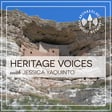
Relational Engagement with Indigenous Communities through the Heritage Lands Collective - Ep 86
On today’s episode, Jessica goes more in depth with Joseph Gazing Wolf (Executive Director, Heritage Lands Collective [formerly Living Heritage Research Council]; Lakota, Nubian, and Amazigh) from Episode 84 on the Boulder Ethnographic-Education Project. On this episode, Joseph talks about how his childhood in Egypt and on the Standing Rock reservation inspired his interest in land, heritage, traditional ways of life, and working with elders. He talks more about his work with his buffalo relatives and how that led him to academia. He discusses how the settler-colonial context of academia is harmful to Indigenous scholars and how people in academic settings can engage with Indigenous communities in a relationally respectful manner. Finally, we conclude by talking about the work Heritage Lands Collective is doing and where Joseph would like to take it in the future, including Indigenous youth internships and youth-elder camps.
Transcripts
- For rough transcripts of this episode go to https://www.archpodnet.com/heritagevoices/86
Links
- Heritage Voices on the APN
- Heritage Lands Collective website
- Traditional Ecological Knowledge Section of the Ecological Society of America Resources Page
- More links available at: https://www.archpodnet.com/heritagevoices/86
Contact
ArchPodNet
- APN Website: https://www.archpodnet.com
- APN on Facebook: https://www.facebook.com/archpodnet
- APN on Twitter: https://www.twitter.com/archpodnet
- APN on Instagram: https://www.instagram.com/archpodnet
- Tee Public Store
